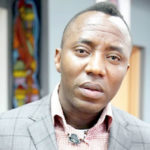Nigeria’s independence anniversary is an interesting moment for exploring the impact of governance and development, not only because the country is emerging from over 59 years of mutual distrust between its leaders and the people but also because of a wider splitting up in the country.
This year’s independence messages by politicians as usual are full of lies and, they come to me as spectacle of ridicule and an abominable muck upon the nation in need of durable solutions.
Can we really be very proud of our standing and the operating political environment, the implicit lack of opposition politics and credible alternative voice? The culture of impunity and banditry is also playing out in many states and the grandstanding of government’s spokespersons on policies and programmes is stomach – turning. The answer has to be a combination of these, so the tone of our 59th year is one of celebration with the usual complacency of the political elite and their collaborators.
There should be no room for complacency in our nation building agenda, particularly with the new wave of nationalism, climate and resource justice across the global north and the centres of political gravity shifting from non-state actors.
Increasingly, emerging economies are investing in and trading with each other and across the global south, without recourse to traditional economic powerhouses.
Democracy is essentially about the wishes of the people, and we must operate within the rule of law, which consists of the respect for fundamental rights and the aspirations of all, including minorities and alternative voices.
Indeed, one of the major impediments and drawbacks to nation building is equity. Inequity is emerging as a common challenge. Equity is central to democratic norms and human development.
President Mohammadu Buhari-led government should focus on economic growth, education, health, child well- being or human capacity outcomes at every level. Untying the knot of multidimensional poverty is essential to moving forward.
Of all the flashpoints in today’s Nigeria, none poses more of a direct threat to its corporate existence than multidimensional poverty. Sadly, the current and fragmented government policy on social protection for the poor should have a human face with a robust and inclusive law that alleviates poverty and deprivation.
The government must pursue an agenda that focuses on mainstreaming social protection frameworks beyond the tokenism of constituency projects of boreholes and empowerment schemes for cheap political gains. A new geography of chronic poverty has berthed in Nigeria.
The sad reality of the moment is that political leaders and bureaucrats often underestimate the issues of poverty sparking violent conflicts and social ills. Additionally, focusing on the contentious issue of electoral management and reforms, and greater citizens engagement will help to shape governance realities on the ground and politicians must reflect on the growing importance of political parties as partners and solution in building better governance template, because no other actor can easily replace their strategic roles in aggregating and representing citizens’ interests.
Looking ahead, Nigerians would like to see concrete and measurable report sheets, timelines, outputs and compelling evidence- based budgeting initiatives intended to improve on the socio – economic opportunities for the poor and the most vulnerable persons.
Above all, a national conversation template on our common identity and a heritage charter that takes cognizance of our pluralistic nature and diversity will help to galvanize the citizens to a common future.
Samuel Akpobome Orovwuje,
Lagos.






